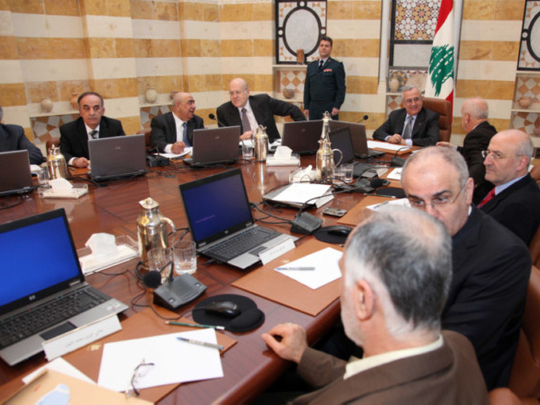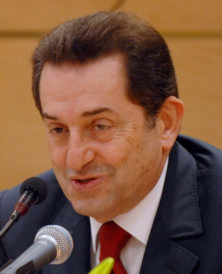
Beirut: Six months before scheduled parliamentary elections, Lebanese politicians have failed to agree on a new electoral law that, presumably, would update the moribund 1960 blueprint while remaining true to both the country’s 1943 National Charter and the 1989 Taif Accords.
The latest skirmishes, which were elevated to Olympic level competitions by wily representatives trying to outsmart each other, hovered around the so-called Orthodox Gathering proposal, which called for every sect to elect its own deputies. A parliamentary subcommittee empowered to make final recommendations to the full chamber, and that included lawmakers from the Hezbollah-led March 8 alliance as well as the opposition March 14 coalition, failed to narrow the wide gap over which legislation to advocate.
Three conflicting draft laws for the 2013 polls were on the table: the Orthodox Gathering proposal; a draft law that would divide Lebanon into 50 small districts under a winner-takes-all system; and the Miqati Government’s draft based on a proportional representation system with 13 medium-sized electoral districts.
Although the Orthodox Gathering proposal received rare backing from the majority of Maronite political parties — Michel Aoun’s Free Patriotic Movement (FPM), the Lebanese Forces, the Kataeb Party and the Marada Movement — along from both Hezbollah and Amal, the President of the Republic as well as the Prime Minister deemed it unconstitutional and divisive.
March 14 deputies, led by Sa’ad Hariri’s Future bloc and Walid Junblatt’s Progressive Socialist Party opposed it too. In fact, public pronouncements in support of the Orthodox Gathering plank notwithstanding, subcommittee members debating the various drafts apparently leaned towards the system based on the 50-districts, which prompted the FPM representative to walkout.
Regrettably, the Orthodox proposal projected to view Lebanon as a single district, even if it purportedly allowed each sect to only elect its own representatives. Only one country in the area boasted a similar system — Israel — where the single constituency preference was chosen in 1948. It was bizarre for Elie Ferezli, the pro-Syrian former deputy and principal author of the draft law, to import the Israeli system into Lebanon.
Though Ferezli seldom made any references to the Israeli paradigm, it was worth noting that colonists introduced the single constituency system to strengthen Israel’s Jewish identity, build on a collectivist ideology at a time when few immigrants shared a common political goal.
Moreover, Israeli leaders settled on this option to specifically exclude Palestinians who stayed on their lands and acquired Israeli citizenship, to further divide and conquer. Thus, the successful model was to deny Galilee residents, an area primarily inhabited by Palestinians, any political weight in parliament. By insisting that the country mesh into a single mold, Israeli leaders guaranteed that Palestinians would wither among the growing mass of colonists, and never threaten the nascent Jewish state.
Alert March 14 Christian lawmakers considered to be independent, like Batroun deputy Butros Harb and Shouf deputy Dany Shamoun, sounded the alarm bells by insisting that the Orthodox Gathering proposal carried with it dangers to the presence of Christians in Lebanon. “The approval of any electoral law based on the principle of ‘each sect elects its own MPs’ entails dangers to the [Lebanese] entity, national unity and the political system, and sets the stage for the toppling of the principle of equal power sharing between Christians and Muslims,” Harb told a news conference after an enlarged meeting of his nascent coalition.
Were it to pass, such a law would not only create fresh divisions among Sunnis, Shiites, Druzes and Christians, as it was likely to emphasise existing popular disparities in the numbers of each sect, but that it would also ensure an inevitable division of the country.
Whether Ferezli, the original author of the Orthodox Gathering proposal, coordinated his vision with Damascus was impossible to know. Still, what could not be ruled out was the notion that Syrian options to further divide that country along sectarian lines — and, in the process, salvage an independent ‘Alawiite bastion for Syrian leader Bashar Al Assad and his brethren — could not, in all objectively, be dismissed as a mere product of the Syrian Revolution. The very notion of viable statelets in Syria would, logically, be strengthened were they accompanied by similar entities next door.
In the event, Lebanon was neither Israel, nor Syria. Its very political raison d’être was based on a specific arrangement that respected the National Charter, while it also complied with the 1989 Constitution. No law that threatened to alter its political system could advance, lest the Lebanese embark on a rebalancing, which would favour one community over the others and that could only be settled through a new civil war. In fact, because Lebanon’s parliamentary democracy allowed for several exceptions, which rejected federalism or even con-federalism, and though the Taif Accords programmed the eventual introduction of a form of decentralization, that day was nowhere in sight as long as fundamental disputes lingered.
For now, Lebanese politicians insisted that a new electoral law would be voted on soon, and that scheduled elections for June 2013 would occur on time. What was left to do was to simply agree on a mechanism that, regrettably, was still under negotiations, though any law based on the single constituency was likely to further enlarge existing political gaps by creating added frustrations.













